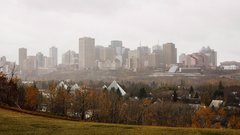Aug 12, 2021
2021 federal election platform tracker: Here's where each party stands
BNN Bloomberg

Canadians headed to the polls Monday after one of the shortest election campaigns ever.
Before that, the leaders of each political party travelled coast-to-coast-to-coast in an attempt to appeal to voters, detailing their plans to revive the economy following the COVID-19 pandemic.
Here’s a look at what each party had promised on the major issues affecting the economy, business and your money.
CHILD CARE
Conservatives
- Scrap all Liberal government child-care funding deals in favour of a refundable tax credit of between $4,560 and $6,000
Liberals
- 50 per cent reduction in average fees for early learning and child care by end of next year
- Reduce child care fees to $10 per day on average within next five years – everywhere outside of Que.
- Invest up to $30 billion over the next five years – minimum of $9.2 billion per year – to make Canada-wide child care system “a reality”
NDP
- Pledging $10-a-day universal child care
Greens
- Dedicate additional resources to making universal, affordable, early learning and child-care system “a reality”
CORPORATE TAXES
Conservatives
- Make foreign tech companies pay “fair share of taxes,” including sales tax and digital services tax representing three per cent of gross revenue in Canada if they don’t pay corporate income tax here
Liberals
- Raise corporate income tax rate by three percentage points – from 15 per cent to 18 per cent – on all earnings over $1 billion at Canada’s largest banks and insurers
- The new tax would generate $5.3 billion between this fiscal year and 2026. Another $5.5 billion would be raised over that same time frame from the Canada Recovery Dividend (a yet-to-be defined temporary levy on those large financial institutions).
NDP
- A temporary 15 per cent tax on large companies that enjoyed windfall profits during the pandemic
- A three-point hike to put the corporate tax rate at 18 per cent
- Pledge to make internet giants “pay their fair share”
Greens
- Apply corporate tax on transnational e-commerce companies doing business in Canada by requiring foreign vendor to register, collect and remit taxes where product or service is consumed
- Implement financial transactions tax of 0.5 per cent in finance sector as France has done since 2012
- Increase federal corporate tax rate from 15 to 21 per cent, bringing it into line with federal rate in the U.S.
- Charge five per cent surtax on commercial bank profits
ENERGY AND ENVIRONMENT
Conservatives
- Eliminate Bill C-69
- Repeal C-48
- Get Trans Mountain expansion built
- Promote “mutually beneficial conversations” between Indigenous communities and resource project proponents, providing $10 million per year to organizations involved
- Invest $1.5 billion to support N.L.’s offshore oil industry
- Introduce zero-emission vehicle mandate based on B.C.’s, requiring 30 per cent of light duty vehicles sold to be zero emissions by 2030
- Invest a billion dollars in building out electric vehicle manufacturing in Canada
Liberals
- Invest $1 billion over 10 years to “restore and protect” large lakes and river systems
- Establish a Canada Water Agency in 2022 to coordinate federal freshwater efforts
- Modernize Canada Water Act to reflect today’s freshwater realities to include Indigenous water rights and address climate change
- Invest $37.5 million over six years to support freshwater research at the International Institute for Sustainable Developments Experimental Lakes Area
- Ensure oil and gas sector reduces emissions to achieve net-zero by 2050
- Require oil and gas companies to reduce methane emissions by at least 75 per cent below 2012 levels by 2030
- Accelerate G20 commitment to eliminate fossil fuel subsidies from 2025 to 2023
- Help Canadians improve energy efficiency of their homes
- Provide grants of up to $5,000 for home retrofits and interest-free loans up to $40,000 for deep retrofits
- Invest $700 million to add 50,000 new electric vehicle chargers and hydrogen stations
- Implement regulated sales requirement that at least 50 per cent of all new light-duty vehicle sales be zero emissions vehicles in 2030
- Develop investment tax credit of up to 30 per cent for a range of clean technologies including low carbon and net-zero technologies
- Eliminate flow through shares for oil, gas and coal projects to help promote clean growth and Canada’s transition to net-zero economy
NDP
- Setting target of reducing emissions by at least 50 per cent from 2005 levels by 2030
- Set target of net carbon-free electricity by 2030, moving to 100 per cent non-emitting electricity by 2040
- Ensure prices at the pumps are fair by creating a watchdog to investigate gouging complaints
Bloc Québécois
- Modify the net-zero emissions law to include clear reduction targets
- Demand a climate test for every new federal policy
- End subsidies for fossil fuels
- Reject every new project related to the transportation of oil across provinces
- Introduce new net-zero emission law to force automakers to carry a minimum amount of EVs in their fleet to make them accessible to consumers
- Move 100 per cent of the federal vehicle fleet to net-zero emission vehicles
- Oppose any new nuclear projects, including new reactors
- Put an end to the Trans Mountain pipeline and oppose any future oil sand project
Greens
- Ensure reduction in greenhouse gas emissions of 60 per cent from 2005 levels by 2030, with “clear enforceable targets and timelines” starting in 2023
- Achieve net zero emissions “as quickly as possible,” aiming to be net negative in 2050
- Cancel all new pipeline projects, starting with the Trans Mountain expansion
- Cancel all new oil exploration projects
- End leasing of federal lands for fossil fuel production, retire existing licences
- Ban fracking
- End all subsidies to fossil fuel sector
- Phase out existing oil and gas operations
- Require federal public investment funds (including Canada Pension Plan Investment Board) to divest from fossil fuels
- Increase carbon taxes by $25 per tonne each year beginning in 2022 and up to 2030
- Ensure that 100 per cent of Canadian electricity is produced from renewable sources by 2030
- Ban the sale of all internal combustion engine passenger vehicles by 2030
- Implement a Carbon Board Adjustment, which will “ensure Canadian companies paying carbon taxes are not placed at a competitive disadvantage with foreign companies located in countries with no such taxes”
- Develop programs to encourage retirement of existing gas-powered vehicles
- Ban further development of nuclear power in Canada
- End export of U.S. coal from Canadian ports
- Include Indigenous Peoples in economic development within the marine and freshwater realms
- Finalize ban on single-use plastics by end of 2021
- Expand list to include “other harmful long-lived plastics,” such as polystyrene
People’s Party of Canada
- Repeal Bills C-48 and C-69
- Approve pipeline projects using “a streamlined process”
- Find a private buyer for Trans Mountain
- Reassert federal jurisdiction over pipeline construction
- “Possibly” revive cancelled projects and keep Line 5 operating by working with industry and American partners
FISCAL PLAN
Conservatives
- $51.3 billion in new spending over five years
- $319.7 billion expected cumulative budget deficit over five years
- Pledging to balance the budget over the next decade
- Says jobs plan will result in lower unemployment rate and thus higher tax revenue and a “responsible” wind-down of emergency spending
Liberals
- $78 billion in new spending over five years
- $25.5 billion in new revenue over five years
- $336 billion expected cumulative budget deficit over five years
- Introduce a $1-billion proof of vaccination fund that will be available to provinces and territories that implement a proof-of-vaccine requirement for non-essential businesses and public spaces
- Immediately invest $6 billion – on top of $4 billion already committed – to support the elimination of health system waitlists
NDP
- $214.5 billion in new spending over five years
- $166.3 billion in new revenue over five years
- $314 billion expected cumulative budget deficit over five years
- Will move to balance the budget “when it is prudent to do so”
- Says long-run finances will be fiscally sustainable based on Parliamentary Budget Officer’s measures
Bloc Québécois
- Call for an increase of the Canada Health Transfer coverage from 22 to 35 per cent of the provinces’ total health costs
- Create a new tax on the wealthy
- Introduce a unique tax filing system managed by the province of Quebec
Greens
- Institutionalize federal transfers to municipalities through the creation of a municipal fund
- Allocate one per cent of GST to housing and other municipal infrastructure on ongoing basis
People's Party of Canada
- Get rid of the deficit in four years and cut personal income taxes, corporate taxes and get rid of the personal capital gains tax after the deficit has been eliminated
- Phase out all COVID spending programs and reverse new programs announced by the Trudeau government
- Review the equalization formula and reduce payments to provinces, making sure that “only the provinces with the greatest needs benefit from it”
HOUSING
Conservatives
- Aim to have one million homes built across the country in the next three years
- Ban foreign investors not living in or moving to Canada from buying homes for a two-year period, encourage foreign investment in affordable purpose-built rental housing
- Encourage new market in seven-to-10-year mortgages to “provide stability” for first-time homebuyers and lenders
- Will not tax Canadians’ capital gains on the sale of their principal residence
- Adjust mortgage stress test to “stop discriminating” against small business owners, contractors and other non-permanent employees, including casual workers
Liberals
- Commit $1 billion in loans and grants towards rent-to-own program
- Program will include landlord committing to charging lower-than-market rate to renter and commit to ownership in a five-year term or less
- Introduce tax-free First Home Savings Account, which allows Canadians under 40 to save up to $40,000 toward their first home with no requirement to repay it
- Give Canadians option of deferred mortgage loan as alternative to shared equity model and reduce monthly mortgage costs
- Increase insured mortgage cut-off from $1 million to $1.25 million and index this to inflation
- Double the First-Home Buyers Tax Credit from $5,000 to $10,000
- Reduce monthly mortgage costs by reducing price charged by Canadian Mortgage and Housing Corporation on mortgage insurance by 25 per cent. Liberal Party says this will save “a typical person” $6,100.
- “Build, preserve or repair” 1.4 million homes in the next four years
- Invest $4 billion in a new fund to grow the annual housing supply in the country’s largest cities every year
- Create target of 100,000 new middle class homes by 2024-25
- Ban blind bidding
- Ban new foreign ownership for the next two years
- Expand the upcoming tax on vacant housing
- Implement anti-flipping tax on residential properties, requiring properties to be held for at least 12 months
- Halt so-called renovictions by “deterring” unfair rent increases
- Will not introduce a capital gains tax on the sale of principal residences
NDP
- Introduce 30-year terms on mortgages insured by Canada Mortgage and Housing Corporation
- Pledging 500,000 “quality, affordable” housing units within 10 years
- 20 per cent tax on homes purchased by foreign buyers
- Waive federal portion of GST/HST on construction of new affordable rental units
- Double homebuyer’s tax credit to $1,500 and roll it into a rebate so money is received when moving in, not at tax time
- Open up borrowing restrictions to allow people to buy a home with friends and roommates
- Give families in need of housing up to $5,000 per year to pay for rent
- Make home inspections mandatory when selling a home
Bloc Québécois
- Invest one per cent of the Federal government’s annual revenue into social housing
- Convert all unused federal properties in affordable social housing to fight the housing crisis
- Introduce a new tax on real estate speculation
Greens
- Appoint a housing advocate to ensure action within infrastructure of the federal government
- Strengthen regulations in order to limit foreign investment and put an end to “predatory practices” in residential real estate
- Refocus the core mandate of the Canada Mortgage and Housing Corporation towards supporting development of affordable non-profit and co-operative housing
- Maintain moratorium on evictions until pandemic is over and for “reasonable time thereafter,” in cooperation with provincial governments
- Raise “empty home” tax for foreign and corporate residential property owners
- Assess role of real estate investment trusts in Canada’s housing market
- Invest in construction of 50,000 supportive housing units over 10 years
- Build minimum of 300,000 units of “deeply affordable non-market, co-op and non-profit housing” over a decade
- Require that housing developments receiving federal funding ensure 30 per cent of all units be “deeply affordable and/or available to people with disabilities and special needs”
- Allocate funding towards urban Indigenous housing providers
People’s Party of Canada
- Reduce “excessive demand” for housing by reducing immigration quotas, from about 400,000 planned by the Liberals, down to 100,000-150,000 per year
- Stop funding social housing
- Privatize or dismantle the CMHC
JOBS AND ECONOMY
Conservatives
- Restore one million jobs lost due to the pandemic within a year
- Pay up to 50 per cent of new hires’ salaries for six months following the end of the Canada Emergency Wage Subsidy
- All companies in Canada will be eligible for this subsidy regardless of revenue loss
- Employment baseline for counting net new hires will be the company’s average employment in April, May and June 2021
- Launch Super EI that temporarily provides 75 per cent of salary instead of 55 per cent when a province goes into recession – EI will return to normal levels once recession is over, as evidenced by three months of job gains
- Expand EI benefits for seriously ill workers from 26 to 52 weeks
- Require gig economy companies to make contributions equivalent to CPP and EI premiums
- Pay full 10.2 per cent of taxable income for CPP either by making CPP contribution on behalf of worker to the CRA or deposit contribution in proposed Employee Savings Account so worker can pay CPP premiums at tax year-end
- Pay equivalent of EI premiums of four per cent of taxable income into a locked-in Employee Savings Account
- Reject mergers that substantially reduce competition and lead to layoffs and higher prices
- Invest $250 million over two years to provide grants to organizations including employers, apprenticeship training delivery agents, unions, post-secondary institutions, and community organizations
- Provide low interest loans of up to $10,000 to people who want to upgrade their skills
- Require federally regulated employers with more than 1,000 employees or $100 million in annual revenue to include worker representation on boards of directors
- Appoint a minister responsible for red tape reduction
- Increase maximum penalty for price-fixing from $24 million to $100 million and introduce criminal penalties for executives convicted of price-fixing, including jail time
- Double the Canada Workers Benefit to a maximum of $2,800 for individuals or $5,000 for families, paying it as a quarterly direct deposit rather than tax refund at year-end
Liberals
- Extend the Canada Recovery Hiring Program to March 31, 2022
- Provide $3.2 billion to provinces and territories to hire 7,500 new family doctors, nurses and nurse practitioners
- Reform economic immigration programs to help temporary foreign workers and former international students
- Establish system to help Canadian companies hire temporary foreign workers to fill labour shortages
- Provide the country’s tourism industry with temporary wage and rent support of up to 75 per cent of their expenses to help them get through the winter months
- Extend COVID-related insurance coverage for media production stoppages to support 150,000 jobs
- Provide all federally regulated workers with 10 days of paid sick leave, pending amendments to Canada Labour Code
- Invest $2 billion to create jobs for fossil fuel workers in Alberta, Saskatchewan and Newfoundland and Labrador
- Require financial institutions to offer flexible repayment options, including mandatory option for six-month deferral of mortgage payments in “qualifying circumstances”
- Establish single independent ombudsperson for handling consumer complaints involving banks
- Crack down on predatory lenders by lowering criminal rate of interest
- Invest $200 million over next four years to establish nation-wide agency to investigate financial crimes and enforce federal law in this area
- Table legislation to ensure that every business and organization that decides to require proof of COVID-19 vaccination from employees and customers can do so without fear of legal challenge
NDP
- Says more than one million jobs will be created in first mandate
- $20 minimum wage
- Sees enhancements to EI program, including making the program available to anyone who quits their job to go back to school, provide child care, or protect health of immunocompromised family members
- Vowing to “build towards” a guaranteed livable income for all Canadians
- Make CEOs who received federal subsidies intended for protecting workers’ jobs pay that money back
- Modernize Investment Canada Act to tighten review of takeovers by foreign entities
- Require large employers to spend at least one per cent of payroll on training for their employees annually
Bloc Québécois
- Suspend the CRB, while making sure it can be reactivated if necessary and remain active for heavily impacted sectors
- Introduce a national reform of the employment insurance which will protect workers, including freelance and seasonal workers
- Hire more workers for long-term cares
Greens
- Replace every high paying fossil fuel sector job with a high paying green sector job through wage insurance, retraining programs and early retirement plans
- Replace one-third of Canada’s food imports with domestic production, bringing $15 billion back into economy
- Fund forestry-based manufacturing facilities in rural Canada to create jobs and keep profits
- Build high-speed rail in Toronto-Ottawa-Montreal-Quebec City triangle and Calgary-Edmonton corridor
- Create “comprehensive and equitable” guaranteed livable income for every person in Canada
- Payment would be set at “livable” level for different regions
- Implement free education for all by getting rid of post-secondary education tuition, which would cost approximately $10.2 billion annually
- Cancel all federally held student loan debt
- Create incentives for employers to hire newcomers and refugee claimants
- Protect supply management systems while allowing small scale production for local markets outside this system
- Reduce interest rates to municipalities on loans for infrastructure projects
- Fully fund universal pharmacare program
- Create bulk drug purchasing agency and reduce drug patent protection periods
- Launch national pharmacare in 2022
People’s Party of Canada
- Says it would set the Bank of Canada’s inflation target at zero per cent instead of two per cent to “preserve Canadians’ purchasing power”
PERSONAL FINANCE/TAXES
Conservatives
- Implement month-long GST holiday this fall with all purchases made at retail stores being tax-free for the month
- Order Competition Bureau to investigate bank fees and require more transparency for investment management fees
Liberals
- Introduce new EI benefit for self-employed Canadians that would last for up to 26 weeks
- Introduce EI Career Insurance Benefit available to those who have worked continuously for same employer for five or more years and are laid off when business closes
- Kicks in after EI ends, providing additional 20 per cent of insured earnings in first year following layoff and extra 10 per cent in second year
- Create minimum tax rule so everyone who earns enough to qualify for top bracket pays at least 15 per cent each year, removing their ability to “artificially pay no tax through excessive use of deductions and credits”
NDP
- Hike the capital gains tax inclusion rate to 75 per cent (from 50 per cent)
- One per cent tax on households with fortunes topping $10 million
- An income tax hike of two points to 35 per cent for the highest bracket – currently $216,511 and above
- Implement luxury goods tax on yachts and private jets
Greens
- Exempt new and used electric and zero-emission vehicles from federal sales
- Apply one per cent tax on net (family) wealth above $20 million
- Close stock options tax loopholes that benefit the wealthy
- Close capital gains tax loopholes
- Focus CRA on identifying people who hide “vast wealth”
- Establish arm’s length Federal Tax Commission to analyze system for “fairness and accessibility”
- Includes recommending an appropriate way to tax cryptocurrencies
- Includes recommending an appropriate way to tax cryptocurrencies
RETIREMENT AND SENIORS
Conservatives
- Prevent executives from paying themselves bonuses while managing a company going through restructuring if pension plan is not fully funded
- Devote $3 billion of infrastructure funding over the next three years to renovate long-term care homes across the country
Liberals
- Permanently increasing the Guaranteed Income Supplement by $500 annually for single seniors and $750 for senior couples
- Double Home Accessibility Tax Credit, providing up to an additional $1,500 to make seniors’ homes more accessible
- Introduce Multigenerational Home Renovation tax credit to support families looking to add secondary unit to their homes
- Boost Old Age Security by 10 per cent next year for seniors 75 years of age and older
NDP
- Guaranteed livable income for seniors and Canadians with disabilities
- Take profit out of long-term care by removing control from big corporations and banning any new for-profit care homes
Bloc Québécois
- Provide a long-term increase of the indexable old age pension of $110 per month for all people above 65
- Suggest an increase of the monthly pension
- Repeal dispositions preventing seniors whose marriage or partnership occurred after 60 from receiving their spouse's pension when they pass
- Implement new measures to promote the work of low-income seniors without penalties
Greens
- Require pension sponsor in event that Actuarial Valuation solvency ratio falls below prescribed threshold to obtain letter of credit to return to 100 per cent solvency or abide by restrictions on corporate cash management
- Amend insolvency legislation to extend super-priority to unfunded pension liability to better protect pensions of all Canadians whose companies file for bankruptcy under the CCAA
SMALL BUSINESS
Conservatives
- Provide a five per cent investment tax credit for any capital investment made in 2022 and 2023, with the first $25,000 to be refundable for small business
- Provide a 25 per cent tax credit on amounts of up to $100,000 that Canadians personally invest in a small business over the next two years
- Provide loans of up to $200,000 to help small and medium businesses in hospitality, retail and tourism, with up to 25 per cent forgiven
- Provide 50 per cent rebate for food and non-alcoholic drinks purchased for dine-in from Monday to Wednesday for one month once it’s safe to do so
- Launch 15 per cent tax credit for vacation expenses of up to $1,000 per person for Canadians to travel within the country in 2022
Liberals
- Increase maximum loan amount from $350,000 to $500,000
- Extend loan coverage from 10 to 15 years for equipment and leasehold improvements
- Introduce a tax credit for small businesses to help with investing in better ventilation. Claims will cover 25 per cent of eligible expenses up to $10,000 per location and a maximum of $50,000 per company
NDP
- Vows to continue wage and rent subsidies until small businesses can fully reopen
- Implement hiring bonus to cover the employer’s portion of EI and CPP benefits for new and rehired staff
- Cap credit card merchant fees at one per cent
Greens
- Extend wage and rent subsidies until pandemic-related restrictions are fully lifted
- Hold small business tax rate at no more than nine per cent
- Eliminate duplicative tax filings and red tape to reduce paperwork burden
TECHNOLOGY
Conservatives
- Cut income tax rate in half on new patented technologies developed in Canada
- Connect every Canadian with high-speed internet by 2025
- Require that Huawei equipment not be used to protect national security
- Allow foreign telecoms to operate in Canada so long as Canadian companies are granted reciprocal access
- Introduce use of flow-through shares for tech companies to avoid the cost and complexity of listing on an exchange
- Exempt Canadian-controlled start-ups headquartered and with at least 2/3 of their employees in Canada from the current plan to tax stock options
Liberals
-
Introduce legislation that would require digital platforms that generate revenues from publication of news to share a portion with Canadian news outlets
NDP
- Price cap on cellphone and internet bills
- Expand cell coverage and deliver broadband internet to every Canadian community, declaring high-speed internet an essential service
Greens
- Break up telecom monopolies through changes to CRTC regulation
TRADE
Conservatives
- Pursue Canada-Australia-New Zealand-United Kingdom agreement that could include free trade and flow of capital investment between the partners
Liberals
- Launch new Asia-Pacific strategy to “deepen diplomatic, economic, and defence partnerships in the region
- Negotiate new bilateral trade agreements
- Expand foreign investment promotion and protection agreements (FIPAs)
NDP
- Support fair trade that “broadens opportunity” in all parts of the country
- Defend Canadian workers in trade negotiations, protect supply management and stand up against unfair tariffs
- “Do more to defend” Canadian workers and communities from unfair trading practices
People’s Party of Canada
- “Put pressure” on provinces to get rid of internal barriers and appoint a minister of internal trade, making it a priority to “liberalize trade and labour mobility between province and territories”
Greens
- Shift direction of international trade away from “free trade” to “fair trade”
- Cease all federal support to Canadian exporters of arms and fossil fuels, with exception of potential necessary sales of peacekeeping equipment in cooperation with the United Nations









